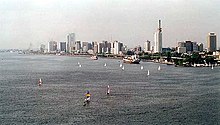Economy of Nigeria

|
|
| Currency | Nigerian naira (NG₦) |
|---|---|
| 1 April 2015 – 31 March 2016 | |
| Statistics | |
| GDP |
$492.986 billion (nominal; 2016) $1,105.343 billion (PPP; 2016) |
| GDP rank | 21st (nominal) / 20th (PPP) |
|
GDP growth
|
|
|
GDP per capita
|
$2,758 (nominal) $6,184 (PPP) |
|
GDP by sector
|
agriculture: 17.8% industry: 25.7% services: 54.6% (2015) |
| 9% (May 2015) | |
|
Population below poverty line
|
33% (2013) |
| 43.0 (2010) | |
|
Labour force
|
74 million (Q2 2015) |
|
Labour force by occupation
|
Accommodation, food, transportation and real estate: 12.2% Education, health, science and technology: 6.3% Farming, forestry and fishing: 30.5% Manufacturing, mining and quarrying: 11.3% Retail, maintenance, repair, and operations: 24.9% Managerial, finance and insurance: 4.2% Telecommunication, arts and entertainment: 1.8% Other services: 8.8% (2010) |
| Unemployment | 13.9% (Q3 2016) |
|
Main industries
|
cement, oil refining, construction and construction materials, food processing and food products, beverages and tobacco, textiles, apparel and footwear, pharmaceutical products, wood products, pulp paper products, chemicals, ceramic products, plastic and rubber products, electrical and electronic products, base metals: iron and steel, information technology, automobile manufacturing, and other manufacturing (2015) |
| 169 (2017) | |
| External | |
| Exports | $93.01 billion (2014 est.) |
|
Export goods
|
petroleum and petroleum products, chemicals, vehicles, aircraft parts, vessels, vegetable products, processed food, beverages, spirits and vinegar, cashew nuts, processed leather, cocoa, tobacco, aluminum alloys (2015) |
|
Main export partners
|
(Q1 2015) |
| Imports | $52.79 billion (2014 est.) |
|
Import goods
|
industry supplies, machinery, appliances, vehicles, aircraft parts, chemicals, base metals (2015) |
|
Main import partners
|
(Q1 2015) |
|
FDI stock
|
$1.1 trillion (2014) |
|
Gross external debt
|
$9.7 billion (2015) |
| Public finances | |
| $56.74 billion; 10.9% of GDP (2015) | |
| $5.2 billion; 1% of GDP (2014) | |
| Revenues | $54.48 billion |
| Expenses | $31.61 billion (2012 est.) |
|
Standard & Poor's: B+ (Domestic) B+ (Foreign) B+ (T&C Assessment) Outlook: Stable Fitch: BB- Outlook: Stable |
|
|
Foreign reserves
|
$42.8 billion (2012) |
Nigeria is a middle-income, mixed economy and emerging market, with expanding manufacturing, financial, service, communications, technology and entertainment sectors. It is ranked as the 21st-largest economy in the world in terms of nominal GDP, and the 20th-largest in terms of purchasing power parity. It is the largest economy in Africa; its re-emergent manufacturing sector became the largest on the continent in 2013, and it produces a large proportion of goods and services for the West African subcontinent. Also, the debt-to-GDP ratio is 11 percent, which is 8 percent below the 2012 ratio.
Previously hindered by years of mismanagement, economic reforms of the past decade have put Nigeria back on track towards achieving its full economic potential. Nigerian GDP at purchasing power parity (PPP) has almost tripled from $170 billion in 2000 to $451 billion in 2012, although estimates of the size of the informal sector (which is not included in official figures) put the actual numbers closer to $630 billion. Correspondingly, the GDP per capita doubled from $1400 per person in 2000 to an estimated $2,800 per person in 2012 (again, with the inclusion of the informal sector, it is estimated that GDP per capita hovers around $3,900 per person). (Population increased from 120 million in 2000 to 160 million in 2010). These figures were to be revised upwards by as much as 80% when metrics were to be recalculated subsequent to the rebasing of its economy in April 2014.
Although much has been made of its status as a major exporter of oil, oil only contributes about 9% to the GDP. Nigeria produces only about 2.7% of the world's oil supply (in comparison, Saudi Arabia produces 12.9%, Russia produces 12.7% and the United States produces 8.6%). Although the petroleum sector is important, as government revenues still heavily rely on this sector, it remains a small part of the country's overall economy.
The largely subsistence agricultural sector has not kept up with rapid population growth, and Nigeria, once a large net exporter of food, now imports some of its food products, though mechanization has led to a resurgence in manufacturing and exporting of food products, and the move towards food sufficiency. In 2006, Nigeria successfully convinced the Paris Club to let it buy back the bulk of its debts owed to them for a cash payment of roughly US$12 billion.
...
Wikipedia
